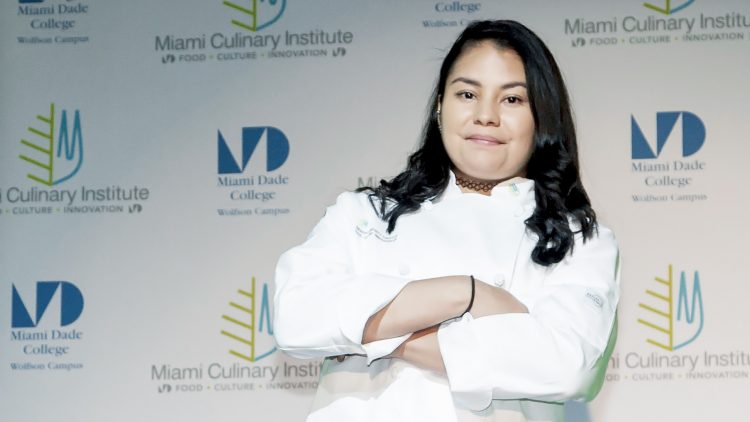Most professional kitchens are noisy places filled with loud talk, banging pots, popping hot oil, knives chopping and water running. It’s all part of the soundscape, but for Joselyn Escobar, 22, the first deaf student at MDC’s Miami Culinary Institute, it’s a whole different world. She’s typically busy watching demos from her instructors and focusing on the hands of her sign language interpreter who dexterously communicates about a range of ingredients, techniques and recipes.
Everyone is adjusting to a new situation. Along with her fellow students, Joselyn is getting used to a working kitchen for the first time while the staff at Miami Dade College’s Culinary Institute is getting used to accommodating the needs of their first deaf student. Together, everyone is finding a way to create a productive learning environment.
Joselyn is aided in her studies by two sign language interpreters who are provided by MDC’s ACCESS center. The interpreters trade off every 20 minutes, so they can keep up with a constant stream of information. The work is difficult and tiring as the interpreters are tasked with not only explaining the various processes of cooking, but also finger spelling a variety of terms that are unfamiliar to most, yet commonplace in the culinary world; terms that are just as often expressed in English as they are in other languages such as French, Italian or Spanish. Mise en place, agridolce and crudo, are the types of terms Joselyn scribbles in her notebook on a regular basis, while scanning faces and body language for additional data that will help her with the lesson.
She’s used to navigating the hearing world using a mix of tools. At home, Joselyn communicates with her father in a skillful blend of Spanish, English, American Sign Language (ASL), and a little bit of lip reading.
Diagnosed as having no hearing in her right ear and very limited hearing in her left, Joselyn received a cochlear implant when she was four and living in Colombia with her family. When she moved to the United States at the age of 6, even though she had some hearing, thanks to the implant, Joselyn was placed in a deaf program because she didn’t speak English. It was then that she learned ASL.
She also eventually learned English and would spend the rest of her school days alternating between learning in mainstream classrooms and deaf schooling. When she turned eighteen, Joselyn asked her doctors to turn off the cochlear implant because she found it distracting. She preferred to make her way in the world as a deaf person and has been living without the implant ever since.
She is generally praised by her instructors as a model student who not only learns the lessons but wants to go further than the study plan. Her drive and ambition are evident when she says she wants to be the first deaf contestant on the popular cooking competition show, Top Chef.
Joselyn is pretty popular among her fellow students as well. They keep an eye on her to make sure she’s okay (kitchens are not typically deaf-friendly spaces), and in turn, Joselyn expands their vocabulary by teaching them to sign words and phrases that they can use with each other across the kitchen.
There is however, one form of communication that all the students inherently share – the look of delight. It’s all that’s needed to make it abundantly clear that they approve when they taste each other’s culinary creations.
Learn more about MDC’s Miami Culinary Institute:
